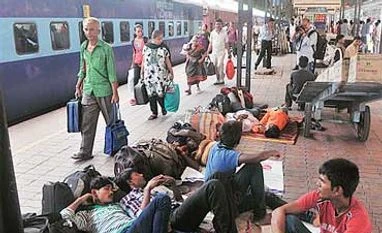Railway Minister Suresh Prabhu would have few of the best brains on railways at his disposal who can offer him good advice on how to transform the Indian Railways. But I wonder whether any of these experts has suggested to him that the next time he plans to visit his home in Pune he should travel in the sleeper-class (non-AC) and not take the flight. If they have, Prabhu should listen to them.
Prabhu will realise, with just a night on the train that a lot can improve on our trains using simple solutions requiring little investment. Let me illustrate this through an example: Earlier this year, I boarded the Vivek Express – India’s longest distance train – from Dibhrugarh to Kanyakumari. Once on the train, I realised that it was almost impossible to use the toilets as their first scheduled cleaning and refilling of water tanks was in Vishakhapatnam – 2,500-kms and 50-hours later. And this was not an occasional slip-up as it was my second time on this train. All this while, over 300 passengers in my coach were expected to share four toilets! If Prabhu or his officials travelled like we did, this situation would never have arisen.
Similarly, it would have stuck Prabhu and the ministers before him that it was impossible to buy a bottle of Rail Neer, Indian Railways own mineral water brand, on the trains. On most routes (especially, outside metro cities), the distribution of mineral water is controlled by the local goon who does not allow Railways to sell their own mineral water and instead use young children to sell their locally bottled water. All this happens in the presence of the railway officials, who either out of fear or convenience look the other way. I am not sure whether this has changed since the Central Bureau of Investigation filed cases against certain railway officials in an alleged scam around Rail Neer.
If Prabhu boards the train, he will realise that the Prime Minister Narendra Modi's Swatchh Bharat mission is a failure at least when it comes to the trains. Our trains continue to remain as unclean as they were before this government took over. At present, there are two dustbins in each coach of the train to collect waste from over 300 passengers (passengers are less in AC compartments as ticket checkers are more vigilant). These bins are often overflowing and consequently passengers either litter their waste on the floor (in AC compartments) or throw it on the tracks (in non-AC compartments). Certainly, ensuring more bins in each coach should not be such an uphill task.
There is no shortage of such examples. But let me list a few which can be addressed with relative ease:
More From This Section
1. Absence of any credible feedback mechanism on the trains through which passengers can offer suggestions or register complaints.
2. A cap on the number of tickets being issued under the waiting-list category on the basis of number of seats likely to be available. This will reduce corruption and ease the burden on the trains.
3. Doing away with reservation quotas on trains. There are at present several quotas under which train seats are reserved. Often these are not used by the persons for whom the quota is intended. Doing so will increase the number of seats.
Lastly, if Prabhu travels like us, it will dawn on him that the last thing the Indian Railways requires at this instance is the bullet train or any such fancy project. Instead, he should ask his senior officials to travel with the common man to fix their immediate problems.
)